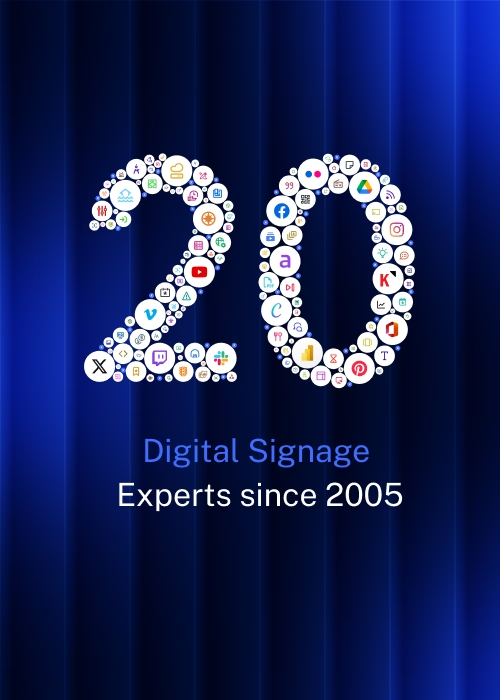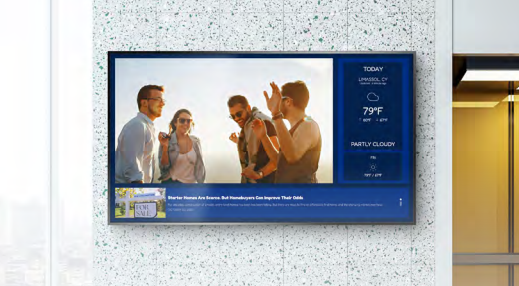5 Security Questions to ask your Digital Signage Software Vendor
New technology can expand your business's functionalities, enrich the customer experience and help improve business processes. However, it can also leave you vulnerable to attacks if you aren't careful about which companies you partner with.
Software companies work hard to keep pace with technology threats. Nonetheless, cybersecurity is inherently a game of catch-up that requires constant vigilance and a structured, proactive approach.
To help you vet providers and find the best and most secure fit for your business model, here are 6 security questions about digital signage software that you should be asking vendors:
1. How often do you test for vulnerabilities and how long does it typically take to remedy any problems?
Think of software as a dynamic, constantly evolving entity. It is impossible to create the Fort Knox of solutions and still feel confident that sensitive data will continue to be protected.
Why?
Because vulnerabilities may have been unintentionally written into the code or they can appear over time.
It takes constant vigilance to identify potential weak spots and make the necessary corrections before a malicious character makes the same discovery. So your vendor should provide evidence of a history of quick resolutions.
Ensure that your vendor is making digital signage software security a top priority and regularly scanning their product.
Ideally, they will use a combination of third-party security assessments and automated code review. These can prevent tunnel vision that can happen during development and to keep constant vigilance. Any reputable vendor worth working with will be excited to provide you will the details of their testing process. They will also talk up the lengths they go to in order to provide protection.
If you find yourself digging for answers, it is time to keep shopping.
2. Do you have a dedicated security team that works on both development and testing?
Digital signage software security should not be an afterthought.
Dedicated security professionals should be a part of the development process to ensure that solutions provide maximum functionality and security. Having a specific team that deals with security issues also means that they will continue to monitor vulnerabilities and make sure that updates are smoothly implemented.
It is a good idea to follow-up with asking what percentage of the company is dedicated to security issues. This answer might reveal more about whether the company actually advocates for optimal security or is just trying to use it as a marketing ploy to sell their services.
3. Describe your process for handling vulnerabilities once they have been detected.
Here is what you should be looking for in their answer:
- The vendor immediately informs customers of the vulnerability. Even if a problem doesn't require any action on your end, you want to be fully aware that something is wrong. You might be held accountable if someone breaches your customers' data. This is also a good sign that the vendor practices transparency. It also allows you to follow up and make sure a solution has been implemented.
- Customers are notified before the public, and they receive a complete threat report. You don't want to be learning about problems with your software as you are reading the morning news. Vendors should contact customers before they make the information public. In addition, vulnerabilities come in a wide range of forms, from simple bugs to full-blown problems. The company should provide a report that categorizes the vulnerability according to a rating system so that you can better understand the situation at hand.
- They quickly release a patch. Some companies thoroughly test patches before they release them. Others simply release any necessary patches on a weekly basis. Either approach is a good sign that there is a process and protocol in place to address your needs.
4. What are the terms of your service-level agreement (SLA)?
The last thing you want is to run into a problem down the line only to realize that your vendor is no longer contractually obligated to address your needs.
A solid agreement will include ongoing support along with a guarantee that the problem will be fixed within a certain time period. Otherwise, the company will be responsible for covering any financial losses caused by their malfunctioning products.
This agreement should also outline exactly how much uptime the vendor is necessary to provide, which protects you in the case of frequent outages.
Essentially, digital signage software security and service agreements should offer continuous coverage that clearly makes customer satisfaction a top priority. Reputable vendors will be willing to stand behind their products and their processes.
5. What types of data transmissions are encrypted?
It is common for SLAs to address weaknesses that occur during the transfer of data between the customer and the service provider. But, you may also want to ensure that intra-server transfers are protected with encryption.
When it comes to digital signage software security, you can't be too cautious. Taking advantage of encryption technology in every instance of data transmission can help discourage and prevent malicious attacks.
****
The average customer won't be well-versed in digital signage software security jargon and challenges and that is okay. Simply navigating the terminology can be intimidating. But, with a little research, you can arm yourself with key questions that will help you identify the best vendor for your brand.
Use these questions to learn more about signage software security requirements and demonstrate that you are an informed consumer who will demand the best in service and security.
The right vendor will be excited to tell you all about the measures they have taken to provide top-notch security.
If you are having trouble getting the information you want, then they probably don't have good answers to your questions about digital signage software security.







